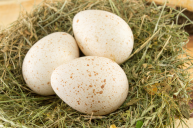You might know why the chicken crossed the road, and you might recall how to read an egg carton, but do you know the difference between brown and white eggs? We tend to think of brown eggs as coming from a farm where happy chickens roam free, pecking at grass and insects, and the farmer collects eggs in a wicker basket each morning.
In other words, we think of brown eggs as being the best eggs, especially since brown eggs cost more at the grocery store. In fact, there's not much nutritional difference between brown and white eggs.
The color of the egg depends on the breed of chicken, as different breeds of chicken produce eggs of different colors. Reddish-brown chickens with red earlobes, which are known as Rhode Island Red chickens here in the United States, lay brown eggs, while white-feathered chickens with white earlobes, known as White Leghorns, lay white eggs. Every once in a while, you see blue eggs or eggs with green pigment, which come from the Araucana chicken, also known as the Easter egg chicken.
It doesn't matter what the eggshell color is; all these eggs have exactly the same taste, nutritional value and amount of calories. All eggs provide cholesterol, omega-3 fatty acids, and protein, no matter their color.
Why do we assume the brown egg is better for us? In part, it's the cost. Brown eggs are more expensive, and because we think cost equals value, we consider brown eggs to be more valuable. Plus, other health foods have eggs we buy at farmers markets and from organic, free-range farms tend to be brown, so there's a connection between brown eggs and healthier.
Really, it all comes down to the chicken. Brown chickens are larger and need more food, which means the per egg cost is higher for the farmer, which translates to a higher cost, no matter where you buy your eggs.
The cost of chicken eggs is also affected by the type of feed (organic or not) and if the laying hens are cage-free or free range. While you may pay a premium at the grocery store for those eggs, there's not a difference in overall taste or nutritional content.
So, it doesn't matter what color your eggshell is. Brown eggs or white, they're all good for all your recipes.
Watch: Healthy Breakfast Popsicles You'll Wait All Night For
This post was originally published on June 12, 2019.




